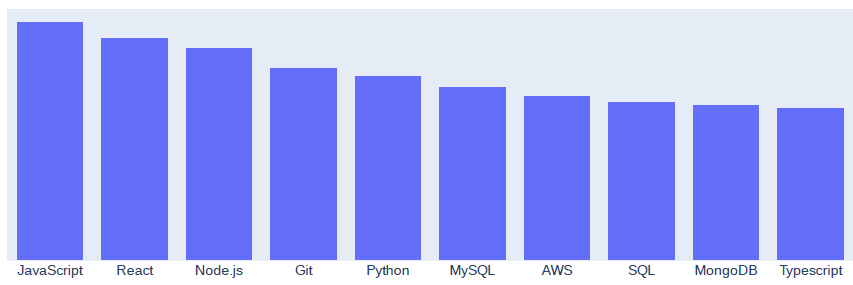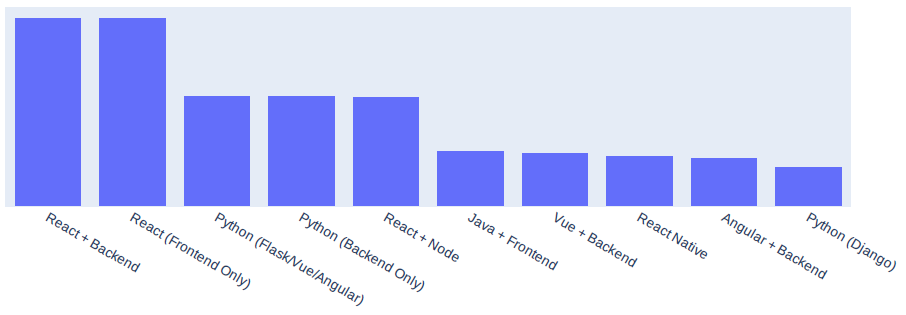There are hundreds of thousands of Silicon Valley caliber developers around the world. And as we all know, demand for great technical talent remains strong.
Unfortunately, many of these talented coders miss out on incredible opportunities. Sometimes both developers and companies lack information about the best match for their skills or needs.
Turing uses AI to eliminate talent sourcing, vetting, and matching work so clients can build and manage remote engineering teams to innovate fast and stay competitive. Under the hood, our advanced vetting engine builds a deep, dynamic profile for every developer to make that perfect connection between client and developer. Those developers enjoy lifetime vetting and matching with long-term, full-time jobs, meaning they avoid the endless series of individual technical interviews and instead get to concentrate on solving complex engineering challenges and growing their career.
While crafting this comprehensive marketplace, we’ve built up a huge dataset that can help developers identify the most in-demand skills and technologies and understand how best to develop their careers.
This article will look at our data to help identify what skills companies need, the gaps between what’s out there and those needs, and how AI could help you advance your engineering career.
What are the high demand skills right now?
When it comes to skills and experience, there are two categories to think about: technical skills and broader project skills.
From a project perspective, we see a high demand for developers with skills and expertise in mobile development, DevOps, and digital transformation. Companies are increasingly building their practices around those used by hyperscalers, so having experience with those workflows is valuable.
On the technical side, there are plenty of in-demand skills, but we see some clear winners. JavaScript, React, and Python are consistently among the most demanded technical skills worldwide. React in particular is highly sought after as part of a developer’s stack.
The graphs below are based on data collected by Turing. We see developers hired for a much broader range of skills than are highlighted here, so it’s not that other skills are unimportant. However, if you’re considering which skills will help further your career, it’s easy to see where the highest demand is.
Top languages and technologies of developers who were hired for roles

Top stacks of developers who were hired for roles

How has skill demand changed since the pandemic?
With so many companies allowing employees to work from home, it’s no surprise that we’ve seen those same companies start moving their tech stacks into cloud computing services. That’s the number one change that we’ve seen over the past two years, and I only expect that trend to accelerate. As a developer, if you have cloud certifications, you’ll have an advantage.
In the last three to five years, we’ve seen the golden era of many new programming languages and tech stacks. On one hand, this has given developers and companies more freedom in choosing the right tools for each project. However, as we head into the second half of 2022 and 2023, the changes we see in macroeconomic conditions will inevitably drive companies to look at their spending. There are still more job openings than developers, but a number of the largest tech firms have announced layoffs or hiring freezes in the first half of 2022.
Along with trimming headcount or slowing hiring, companies are trying to consolidate the tech stacks they work with. Today's biggest headache for a head of engineering or a CTO is the number of technologies used in their products or engineering programs. It’s not sustainable in the long run to rely on so many different languages—it’s too expensive and cumbersome to maintain and hire for. The age of the polyglot developer is passing, and companies prioritize hiring developers who specialize in the technologies most important to their goals.
What does that mean for developers? The most in-demand developers are agnostic to programming languages and see them more as a tool and less as something that defines them. Developers willing to invest in learning and working with new in-demand stacks and languages will always thrive.
Is experience the only route to advancement?
Right now, we’re going through a generation shift.
The 1990s saw a rush of developers enter the market, excited by the possibilities of the rapidly evolving internet. Hiring managers often looked at indicators like undergraduate degrees and years of experience to choose the right candidates. Our data indicates that they still do. In the last three to five years, however, we’ve seen a generation of developers emerge who treat writing code not as an academic pursuit, but as a trade they learned online. Hiring managers are confused about what to look for—so they fall back on simple factors like years of experience.
When we launched the Turing platform, companies were still hell-bent on hiring candidates with X number of years of experience. But the data we’ve gathered from vetting and placing developers shows that years of project experience doesn’t always correlate to a developer’s ability. That sounds obvious, but when hiring for many roles, it’s easy to use years as a proxy for what you really want—in this case, to judge an applicant’s ability level.
Once a developer has three years of experience, it’s much more about the quality of their work. That’s where our technical exam comes in. When you have the data to present to a company, it’s easy to show that the most suitable candidates for their roles aren’t necessarily those with the longest experience but those with specific traits and accomplishments that closely match their needs.
There’s no getting away from needing some experience under your belt. Most high-demand candidates have a minimum of three years of experience. After that, it becomes less important, but it’s hard for a developer to gain valuable experience and an in-demand skill set without a few years in the industry.
High-demand candidates generally have real-world project experience in two areas: building new products and features and supporting production systems. In the last year, we’ve made some progress in better measuring actual skill levels and changing that mindset for most of our customers.
Lots of engineers want to be part of new development projects but aren’t so interested in supporting production systems. I can’t stress this enough. Companies double down on candidates with experience in new feature development AND supporting a high-volume, high-throughput system in production. Not every project will be building new applications and features; plenty of companies will need you to support their existing codebase. If you can build expertise in both, you’ll be in high demand and set yourself apart from other candidates.
How do we fill the gap between supply and demand?
Developers are in huge demand. But the skills that developers want to learn and what companies want to hire aren’t always the same. Developers in general love learning about new technologies. But companies, especially established companies, need to fill roles for more traditional languages like Java and .NET. If you show expertise in one or more of these languages, you’ll likely find a company who needs you to work on their existing codebase.
That said, technology never sleeps. As I mentioned above, this is a golden age for new technologies, and over the next 18 months, you’ll see interest in them increase, both from companies shifting their tech stack and engineers skilling up on new languages and frameworks.
Naturally, it’s not always easy for companies to secure the talent they need, particularly when working with niche languages and technologies.
To fill this gap, companies need to consider developers from a broader geographic area. Remote work has proved a success, especially in our field, and part of what we do at Turing is matching companies with developers regardless of location. This gives both parties access to a broader range of opportunities and will help fill the gap between supply and demand.
What does the future hold?
Predicting the future of technology can be difficult because it changes so quickly. However, from a developer’s perspective, you can think strategically about the next 12-18 months. With the right data, it’s easy to see which skills will be the most valuable for your career within that period.
We see two main drivers of demand in the foreseeable future.
First, hyperscalers and a few select SaaS companies will continue to drive demand for developers and their skill sets. We’ve already looked at the top skills earlier in this article, and we believe these will remain fairly constant for the foreseeable future. If anything changes, we’ll see it quickly in our data, and that information will be available to our candidates.
Can AI support your career?
Based on our data, I have no doubt that AI can help developers progress their careers, both in terms of identifying the skills they should focus on and the opportunities they have. We monitor hundreds of job boards to give developers real-time signals that can inform their learning and professional development.
Turing removes a lot of bias and misunderstandings from the hiring process. It doesn’t matter where you’re located or where you went to school—if our vetting of your experience and skills shows you’re a strong candidate, you’ll have a chance to work with top U.S. companies.
If you’re a developer looking for a new career opportunity, test yourself with Turing. Before you know it, you’ll be applying to full-time, long-term remote software jobs from the comfort of your home.
